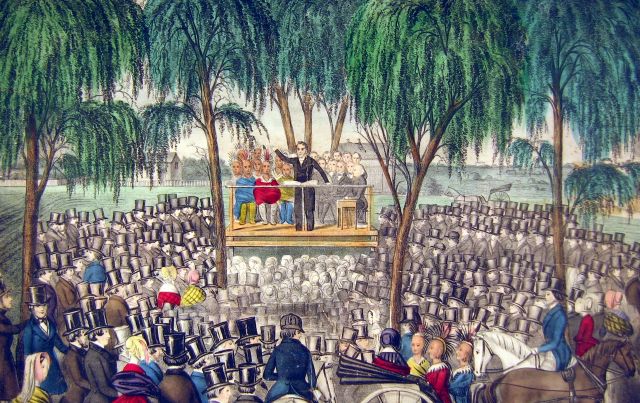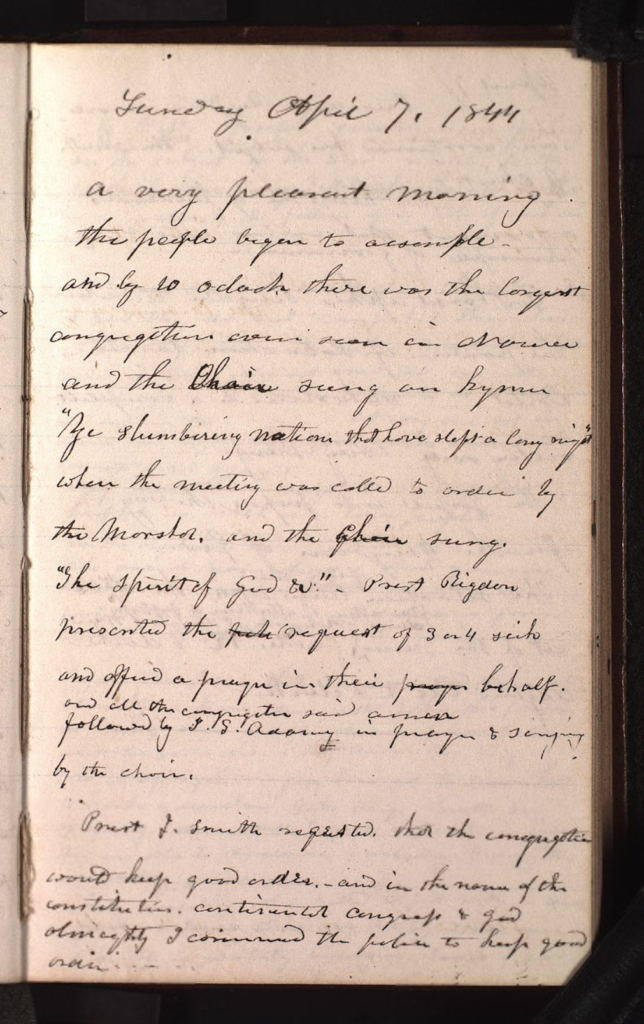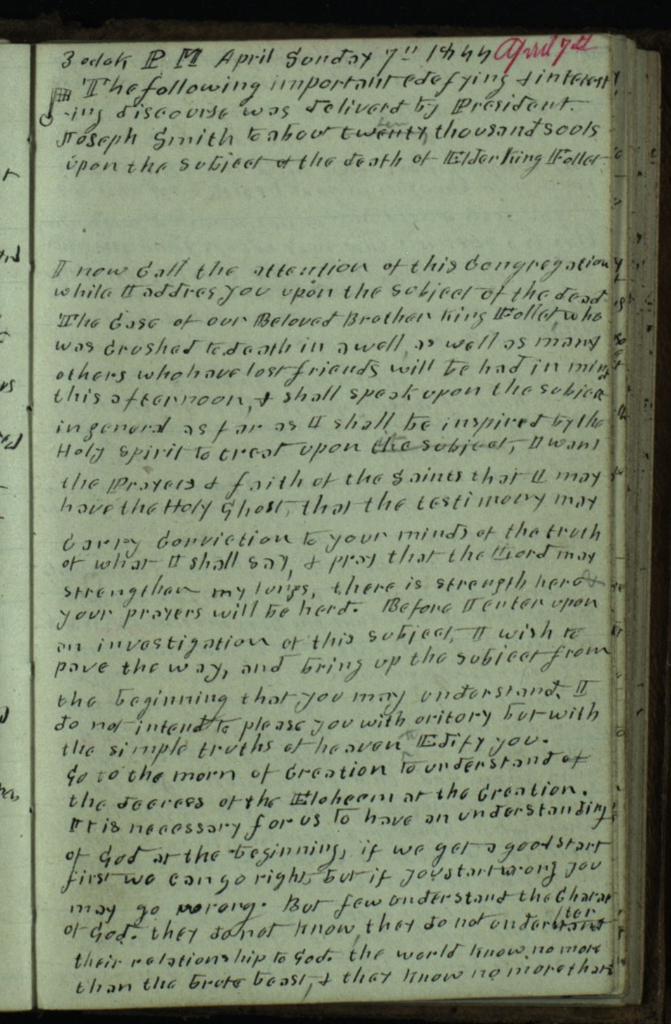Required Reading: “Becoming Like God”
Optional Reading: Matthew J. Grey, “The Apostolic Fathers as Witnesses to the Early Christian Apostasy”
Memorize and internalize concepts and dates in bold typeface.
Professor Stephen Webb (1961-2016) was a devout Christian but not a Latter-day Saint. He wrote the book Mormon Christianity: What Other Christians Can Learn from the Latter-day Saints (2013). It says:
“The traditional view, which is often called classical theism, holds that God is utterly unique. God is not one of the things of this world. He is absolutely transcendent, and as such, God is utterly beyond the stretch of our imagination, let alone the range of our knowledge. We can know God only if and when God reveals himself to us, but even then we do not know God’s substance (or essence). . . . Classical theists think the idea that God is embodied is nonsensical. It is like saying squares are round. If it is the nature of God to be pure spirit, then by definition God cannot have or be a body. Classical theism was slow to develop in the church [Christianity] and did not receive its most systematic treatment until the work of Thomas Aquinas (1225-1274), but most Christians today share its assumption that God is immaterial” (pages 4-5).
The most important thing to internalize from this lesson is the contrast between the restored truths God revealed about himself to Joseph Smith and classical theism
How classical theism’s assumption that God is immaterial came to have a hold on Christianity:
-
-
- Jesus Christ, the Son of God, was born of a virgin, crucified for the sins of the world, resurrected, and ascended into heaven after promising to return someday
- That, at least, was the testimony of eyewitnesses of his majesty–apostles he chose and ordained
- They contributed to biographies of Jesus and a history of their acts as apostles
- The epistemology (or way of knowing) of these records is eyewitness testimony–they knew because they were witnesses. That is a posteriori knowledge, a little Latin that means based on experience
- Eyewitness accounts were compiled and recorded in the Bible–we know their testimonies because they were recorded in historical records
- In their historical records, apostles prophesied apostasy
- In their letters to Christians, apostles documented apostasy
- By about 100 AD there were no more active apostles
- Theologians replaced apostles and theology replaced experience and eyewitnesses
- Theology is typically a priori, a little Latin that describes knowledge gained from reasoning and deduction
- Theologians reasoned and deduced based on teachings of Parmenides (born about 515 BC)
- Philosophy professor James Faulconer wrote: “As he is usually interpreted, Parmenides gave careful, rational arguments that the transcendent ultimate must not only be unchanging, it must be unmoving, indivisible, unaffected, and outside time–since each of those things implies change.”
- “When later thinkers began to think about the Jewish and Christian God philosophically–as they had to from at least the second century on–they tended to do so in Parmenides’s terms. Those were, after all, the intellectual common currency of the time, the ideas available to early Christian thinkers for explaining their belief to others. They could no more have thought in other terms than we could explain how our houses are lit without using the language of electricity.”
- “Parmenides’s way of thinking about reality became an embedded cultural assumption. In fact, the Parmedian assumption was all the more powerful because it was unconscious. Not knowing they were making that assumption made it difficult for early Christians to avoid it” (Faulconer, Thinking Otherwise, 5-8).
- Beginning in 325 AD, Roman emperors convened councils of bishops who were theologians
- The councils agreed on creeds that codified the nature of God and Christ
- Based on the Parmedian assumption, theologians decided, using words not found in scripture, that God and Christ were of one uncreated substance
- This implied that God is immutable (does not ever change in any way) and impassible (cannot experience emotion, pleasure, pain, or anything that seems human)
- When your Christian friends ask you if you are a Christian, they are asking if you accept these ideas about who and what God is. They are asking if you believe in the Christ of the Christian creeds
-

Imagine it’s April 7, 1844 in Nauvoo, Illinois. The Mississippi River is rolling along. The prairie grass and the trees are green. It smells like spring. It’s a very pleasant morning and by 10 AM thousands of saints have gathered in the open air to listen to the last General Conference talk Joseph Smith will ever give.
- Joseph knows that he does not have long to live.[1] What will he say? He decides to speak in memory of “Beloved Brother King Follet” who recently died in an accident. Joseph asks the saints to pray that he would have the Holy Ghost and that the Lord would strengthen his lungs. Find the sources of this King Follett discourse, as it became known, and some source criticism, on The Joseph Smith Papers website. The sources include Wilford Woodruff’s journal entry. It’s Wilford’s best effort to reconstruct Joseph’s sermon.[2]

- “It is necessary for us to have an understanding of God at the beginning,” Joseph says. “If we get a good start first we can go right, but if you start wrong you may go wrong.”
- Joseph asked: “What kind of a being is God? . . . have any of you seen or herd him or communed with him[?] . . . . The scriptures inform us that this is eternal life to know the ownly wise God & Jesus Christ whome He has sent. [So] . . . if you dont know God you have not eternal life. [So] . . . . find out what kind of a being God is.”
Joseph then testified: “God who sits in yonder heavens is a man like yourselves That GOD if you were to see him to day that holds the worlds you would see him like a man in form, like yourselves.”

- That radical, restored truth challenged classical theism. Joseph learned from God that the creeds were wrong (JSH 1:19 and Manuscript History A1). So Joseph rejected the assumption on which traditional Christianity is based. The God Joseph knew was not a theological abstraction. The God Joseph knew was mutable or capable of change, of becoming God. He was also passible, meaning that he not only had a body, he had passions. He could suffer. The God who revealed himself to Joseph Smith became God and was perfectly passible. Joseph taught that all people are children of God, with potential to become like him. Joseph taught that God, and later Christ, had become exalted, and that because of them we could become exalted too, but not overnight. “It will take a long time after the grave,” he said. Joseph taught: “You have got to learn how to make yourselves God, king and priest, by going from a small capacity to a great capacity to the resurrection of the dead, to dwelling in everlasting burnings . . . to be an heir of God & joint heir of Jesus Christ enjoying the same rise exhaltation & glory untill you arive at the station of a God.”
Joseph knew that he was speaking to converted Protestant Christians who might find his teachings challenging to their assumptions about God. So he turned to the first verse of the Bible and showed that his teachings were grounded in the Bible, not in Greek philosophy. He taught that the verb translated as created in Genesis 1:1 refers to organizing both spiritual and elemental matter into divine beings with power to become exalted as God is. From his Hebrew studies and from the Book of Abraham, Joseph knew that the word translated as God in Genesis 1:1 is plural–Gods. Gods created. “The Gods came together & concocked the plan of making the world & the inhabitants,” he said.
So Joseph rejected the traditional Christian–but not Biblical–doctrine that God created out of nothing, or ex nihilo. Wilford and thousands of others must have been on the edges of their seats, if they even had seats.
Joseph used the ring on his finger to illustrate what the Lord had revealed to him. There are two basic kinds of stuff–element and intelligence. Neither was created or made. They can’t be (DC 93). They’re like a ring, Joseph said, with no beginning and no end. God and people are made out of this stuff. God made people out of this stuff but did not make the stuff.
“The relationship we have with God places us in a situation to advance in knowledge,” Joseph said. The Lord had taught him over the years that intelligence is the same as light, truth, life, law, glory, and power (DC 88, 93). God offers us intelligence on terms and conditions (laws of God). And we can accumulate intelligence by choosing to obey God’s laws (DC 51, 88, 93, 130). Put another way, we are endowed with God’s power when we keep covenants.
As Joseph put it, “God has power to institute laws to instruct the weaker intelligences that they may be exalted with himself.” Joseph declared that he knew these truths “by the revelations of Jesus Christ.”
In the quest for truth, we will start right if we understand that we belong to a Heavenly Family. We are here on purpose. We are children of Heavenly Parents, whose divine Son, Jesus Christ, was part of the plan from the very beginning to exalt us in their image—if that is what we want.
Professor Webb was really great at identifying and interrogating the assumption on which Christianity is based. He asked, “What if Joseph Smith’s vision of God really does have something important to say to all Christians today? What if his insight into the materiality of the divine is what the world today most needs to hear?” (Mormon Christianity, 8-9).
The assumption about God that is embedded in the creeds of Christianity led to apostasy. In the next lesson we will see how apostasy shaped a family that was ripe for restoration.
Notes
[1] “Lucy Mack Smith, History, 1845,” p. 241, The Joseph Smith Papers, accessed May 18, 2022, https://www.josephsmithpapers.org/paper-summary/lucy-mack-smith-history-1845/249; https://www.churchhistorianspress.org/the-first-fifty-years-of-relief-society/part-1/1-2/1-2-7?lang=eng; Woodruff, Journal, Apr. 9, 1842, and July 28, 1844.
[2] “Discourse, 7 April 1844, as Reported by Wilford Woodruff,” p. [133], The Joseph Smith Papers, accessed May 18, 2022, https://www.josephsmithpapers.org/paper-summary/discourse-7-april-1844-as-reported-by-wilford-woodruff/1.
